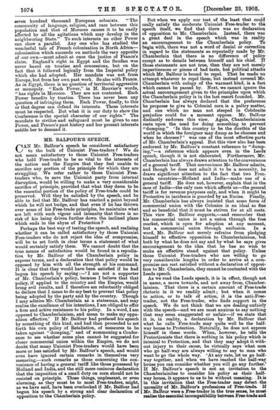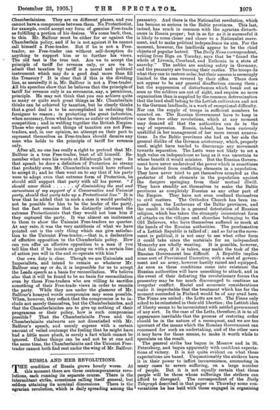Perhaps the best way of testing the speech, and realising
whether it can be called satisfactory by those Unionist Free-traders who do not reject the idea of compromise, will be to set forth in clear terms a statement of what would certainly satisfy them. We cannot doubt that the true means of satisfaction would be found in a repudia- tion by Mr. Balfour of the Chamberlain policy in express terms, and a declaration that that policy would be opposed by him with all the strength at his command. It is clear that they would have been satisfied if he had begun his speech by saying I am not a supporter of Mr. Chamberlain's policy, because I believe that that policy, if applied to the country and the Empire, would bring evil results, and I therefore am reluctantly obliged to declare that I mean to do my best to prevent that policy being adopted by the party and by the country. Though I may admire Mr. Chamberlain as a statesman, and may realise the excellence of his intentions, I am obliged to offer a firm and active resistance to his policy. In a word, I am opposed to Chamberlainism, and mean to make my oppo- sition effective.' If Mr. Balfour had prefaced his speech by something of this kind, and had then proceeded to set forth his own policy of Retaliation, of measures to be taken against " dumping," and of summoning a Confer- ence to see whether some plan cannot be suggested for closer commercial union within the Empire, we do not doubt that many Unionist Free-traders would have been more or less satisfied by Mr. Balfour's speech, and would even have ignored certain remarks in themselves very menacing,—such remarks as those concerning the con- venience of having a general tariff like those possessed by Holland and India, and the still more ominous declaration that the imposition of a small duty on corn should not be resisted on principle. These things, unpleasant, or even alarming, as they must be to most Free-traders, might, as we have said, have been overlooked if Mr. Balfour had begun his speech by a strong and clear declaration of opposition to the Chamberlain policy. But when we apply our test of the least that could really satisfy the moderate Unionist Free-trader to the speech itself, we find that there was no declaration of opposition to Mr. Chamberlain. Instead, there was a great deal in the speech which was in reality an encouragement to the Chamberlain policy. To begin with, there was not a word of denial or correction in regard to the statements so repeatedly made by Mr. Chamberlain that there is no difference of policy except as to details between himself and his chief. If those statements are not true, then they are not merely impertinences or pieces of bad taste, but political attacks which Mr. Balfour is bound to repel. That he made no attempt whatever to repel them, but instead covered Mn Chamberlain with eulogy of the warmest kind, is a fact which cannot be passed by. Next, we cannot ignore the actual encouragement given to the principles upon which the Chamberlain policy is in the last resort founded. Mr. Chamberlain has always declared that the preferenee he proposes to give to Colonial corn is a paltry matter, and one which no man not steeped in Cobdenite prejudice could for a moment oppose. Mr. Balfour distinctly endorses this view. Again, Chamberlainism rests upon the need for doing something to prevent "dumping." 'Is this country to be the dustbin of the world in which the foreigner may dump as he chooses and when he chooses ? ' was one of the most effective parts of Mr. Chamberlain's appeal. But this view also has been endorsed by Mr. Balfour's constant reference to " dump- ing,"—a reference which appears even in the Leeda speech, though it is not elaborated. Furthermore, Mr. Chamberlain has always drawn attention to the convenience of a general tariff. That convenience Mr. Balfour admits, and though he does not admit it to be a necessity, he draws significant attention to the fact that two Free: trade countries—Holland and India—make use of a general tariff. He does not, however, explain that in the case of India—the only case which affects us—the general tariff is for revenue purposes only, and when it might be Protective in incidence is guarded by an Excise. Finally, Mr. Chamberlain has always insisted that some form of commercial union with the Colonies is an ideal so fine and so beneficial that it must be striven for at all costs: This view Mr. Balfour supports,—and remember that his commercial union is not a, union through the free market, which is open for adoption at any moment, but a commercial union through exclusion. In a word, Mr. Balfour not merely refrains from pledging himself to effective opposition to Chamberlainism, but both by what he does not say and by what he says gives encouragement to the idea that he has no wish to make an effective stand against that policy. Unless those Unionist Free-traders who are willing to go very considerable lengths in order to arrive at a com- promise can rest satisfied without a declaration of opposi- tion to Mr. Chamberlain, they cannot be contented with the Leeds speech.
As we read the Leeds speech, it is in effect, though not in name, a move towards, and not away from, Chamber- lainism. That there is a certain amount of Free-trade rhetoric in it we readily admit ; but when it comes to action, or to talk of action, it is the anti-Free- trader, not the Free-trader, who finds support in the speech. We do not think that we are dealing unfairly with the speech—and we are most anxious to say nothing that may seem exaggerated or unfair—if we state that it is, in reality, a declaration by Mr. Balfour that what he calls Free-trade may quite well be the half- way house to Protection. Naturally, he does not express himself in these words. When, however, he tells the Protectionists that there is nothing in his policy which is inimical to Protection, and that they may adopt it with.. out injury to their cause, he virtually says what men who go half-way are always willing to say to men who want to go the whole way. 'At any rate, let us go •half- way together, and when we have reached the half-way house you can consider whether you will go any further.' If Mr. Balfour's speech is not an invitation to the Chamberlainites to consider his policy as their half- way house, it appears to us to be without meaning. Ibis in this invitation that the Free-trader may detect the unreality of Mr. Balfour's professions of Free-trade. If Mr. Balfour were a Free-trader in the true sense, he must realise the essential incompatibility between Free-trade and Chamberlainism. They are on different planes, and you cannot have a compromise between them. No Protectionist, for example, could accept any form of genuine Free-trade as fulfilling a portion of his desires. We come back, then, to this. Mr. Balfour must be either for or against the Chamberlain policy, and if he is not against it he cannot call himself a Free-trader. But if he is not a Free- trader, no Free-trader can without self-deception do anything to support him or to further his views. The old test is the true test. Are we to accept the principle of tariff for revenue only, or are we to admit that taxation by tariff is a moral and political instrument which may do a good deal more than fill the Treasury ? It is clear that if this is the dividing line, as assuredly it is, Mr. Balfour is not a Free-trader. All his speeches show that he believes that the principle of tariff for revenue only is an erroneous, nay, a pernicious, principle. He may not think that you can achieve quite so many or quite such great things as Mr. Chamberlain thinks can be achieved by taxation, but he clearly thinks that a good deal is to be accomplished in reducing the foreigner to reason ; in protecting the great industries, when necessary, from what he views as unfair or destructive competition ; and in welding together the British Empire. Those who expect such things of taxation are not Free- traders, and, in our opinion, no attempt on their part to represent themselves as Free-traders should deceive any man who holds to the principle of tariff for revenue only.
After all, no one has really a right to pretend that Mr. Balfour is a true Free-trader, least of all himself. Re- member what were his words at Edinburgh last year. In that speech he drew a definition of Protection so strong that probably even Mr. Chamberlain would have refused to accept it; and he then went on to say that if his party were to adopt even that extreme form of Protection, he should still support that party with all his power. " I should never think of diminishing the zeal and earnestness of my support of a Conservative and Unionist party, should that party take up a Protectionist line." It is true that he added that in such a case it would probably not be possible for him to be the leader of the party, but the fact remains that he distinctly informed the extreme Protectionists that they would not lose him if they captured the party. It was almost an incitement to them to show the Unionist Free-traders no quarter. At any rate, it was the very antithesis of what we have pointed out is the only thing which can give satisfac- tion to the Unionist Free-trader,—that is, a declaration of effective opposition to the Chamberlain policy. How can you offer an effective opposition to a man if you tell him that if he insists on going on with a certain line of action you will in the end co-operate with him ?
Our own duty is clear. Though we are Unionists and Imperialists, and intend to remain so whatever Mr. Balfour may say or do, it is impossible for us to accept the Leeds speech as a basis for reconciliation. We believe also that it will be found to be no basis for reconciliation even by those Free-traders who are willing to sacrifice something of their Free-trade views in order to reunite the party. While they are under the glamour of Mr. Balfour's honeyed words compromise may seem possible. When, however, they reflect that the compromise is to in- clude not merely themselves, but the Chamberlainites, and that the Chamberlainites are to give up nothing of their programme or their policy, how is such compromise possible ? That the Chamberlainite Press and the Chamberlainite stalwarts are not dissatisfied with Mr. Balfour's speech, and merely express with a certain amount of veiled contempt the feeling that he might have had a. little more pluck, is surely a fact which cannot be ignored. Unless things can be and not be at one and the same time, the Chamberlainite and the Unionist Free- trader cannot both find rest under the wing of Mr. Balfour.
RUSSIA AND HER REVOLUTIONS.







































 Previous page
Previous page